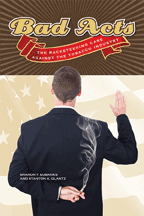March 23, 2012
We just published a paper showing the need for ongoing pressure on politicians to keep tobacco control programs not only alive, but functioning and effective. In Florida the health groups secured a constitutional amendment to create and fund a tobacco control program that had to follow CDC best practices. The problem is that the Crist Administration and its health department purposefully maladministered the program so that it would not have much effect and the health groups were unwilling to force them to do a good job.
This failure not only meant that more people are smoking in Florida, but that the poor results there can be used to undermine CDC best practices, claiming that they don’t work.
Here is the abstract in the American Journal of Public Health:
March 20, 2012
We must have hit a really raw nerve at Philip Morris with our December 2011 paper, "The toxic effects of cigarette additives. Philip Morris' Project Mix Reconsidered: An Analysis of Documents Released through Litigation," that showed how Philip Morris used tricky normalizations and underpowered studies to try an argue that additives did not increase cigarette toxicity when, as we said in the paper, "The case study of Project MIX shows tobacco industry scientific research on the use of cigarette additives cannot be taken at face value. The results demonstrate that toxins in cigarette smoke increase substantially when additives are put in cigarettes, including the level of [total particulate matter]."
March 14, 2012
Sharon Eubanks, the lawyer who led the Department of Justice team that won the Racketeer Influenced Corrupt Organization Act case against the tobacco industry, and I are publishing a book,. Bad Acts, that tells the behind-the scenes story of the case.
Here is a description of the book:
On January 20, 1999, President Bill Clinton announced in his State of the Union address that the Justice Department was planning to sue the tobacco industry and assigned the task to Attorney General Jane Reno and the Justice Department. This book is the story of that case - the politics, the litigation, the behavior of the industry and its lawyers, the efforts by the Bush Administration to gut the case, and the ultimate victory in court.
to sue the tobacco industry and assigned the task to Attorney General Jane Reno and the Justice Department. This book is the story of that case - the politics, the litigation, the behavior of the industry and its lawyers, the efforts by the Bush Administration to gut the case, and the ultimate victory in court.
March 11, 2012
Daniel Mackay, Scott Nelson, Sally Haw and Jill Pell just published a very nice paper that looked at the effect of the Scottish smokefree law on complications of pregnancy (small for gestational age, preterm delivery and spontaneous preterm labor, among other outcomes). They found a 5-12% drop in these conditions for women who got pregnant beginning shortly before the law too effect. This is not only another high-quality study demonstrating large and clinically meaningful benefits of smokefree laws in terms of health, but also shows that the real economic effect of smokefree laws is to substantially reduce medical costs. The full paper is available for free at www.plosmedicine.org/article/info%3Adoi%2F10.1371%2Fjournal.pmed.1001175 Check it out.
